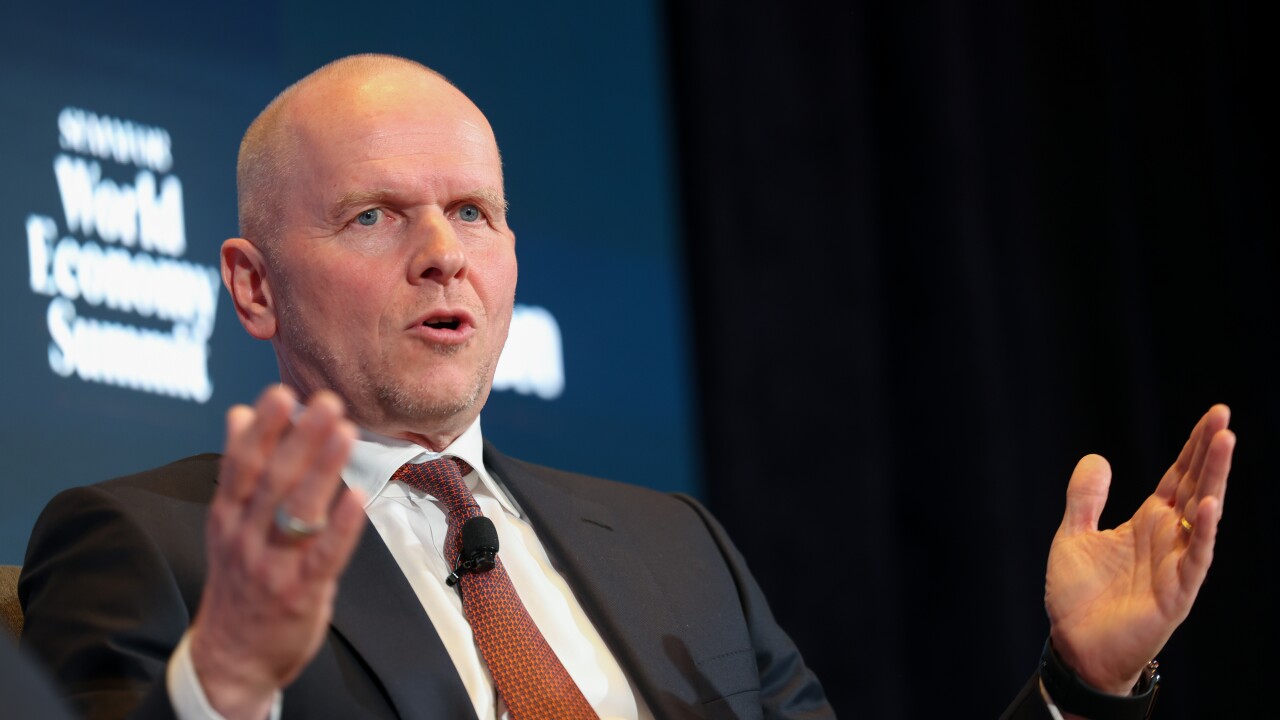-
Visa Inc. said revenue and income rose in its fiscal first quarter as transaction and payment volume rose.
February 2 -
MasterCard Inc.'s fourth-quarter revenue rose 10.7% from a year earlier to $1.4 billion as transactions made with its credit and debit cards rose.
February 3
As the payment industry awaits the Federal Reserve Board's final rule on debit interchange pricing, Visa Inc. and MasterCard Inc. are preparing to counter — or failing that, adapt to — the changes.
Visa's chief executive officer, Joseph W. Saunders, has warned about unintended consequences of debit interchange reform, and MasterCard CEO Ajay Banga said he hopes to see the changes delayed or scaled back. Banga said he has made several recent trips to Washington to speak directly to legislators.
Despite those efforts, "I'm planning on the basis of: What's being talked about right now will go right through," Banga said on a conference call Thursday to discuss fourth-quarter results. "Ninety-nine-point-nine percent of the company is focused on 'this is going right through.' "
In December, the Fed announced a rule proposal to cap the interchange fees merchants pay to accept debit card payments. It is accepting comments through Feb. 22 and is required under the Dodd-Frank Act to adopt final rules by April. These rules would take effect in July.
As they currently stand, the reforms would cap debit rates at 12 cents per transaction. They would not apply to debit issuers with less than $10 billion of assets.
Visa has already announced that it will support a two-tiered interchange system to accommodate higher fees for smaller financial institutions. MasterCard has not yet said whether it would support a two-tiered rate structure.
Some retail banks have already announced that they are imposing fees on traditionally free products, such as checking accounts. Others have suggested they would charge fees on debit cards.
Both Visa and MasterCard have already moved to offset the effects of the debit regulation by adding revenue sources.
In the past year, each has acquired technology companies that will let them provide third-party-developer platforms and offer mobile payments on smartphones.
Banga said MasterCard is focusing some effort on prepaid cards. The Purchase, N.Y., company has been shifting some of its focus to emerging markets as well.
In October, MasterCard bought DataCash Group PLC, a U.K. credit-card processor, to expand its e-commerce business. In December, the payment network said it would buy the prepaid program management assets of Travelex Holdings Ltd. in London.
"We are preparing ourselves for the worst-case scenario in the U.S., so we are looking at our business and what the banks would like to do going forward," Martina Hund-Mejean, MasterCard's chief financial officer, said in an interview Thursday. "In addition to that, we are focusing on our outside-the-U.S. business. As you can see, from a pure growth opportunity, Asia-Pacific, the Middle East, Africa, are just bigger growth engines."
Hund-Mejean said she would not speculate on the effect of the final Fed rules.
"The only thing that I'm pretty comfortable with saying is that people are not going to go back for cash and check," she said.
Visa is taking a similar approach.
In a regulatory filing Wednesday, it said the "continuing worldwide secular shift to digital currency may help buffer the impacts of the Reform Act, as reflected in our overall payments volume growth, particularly outside the United States."
Still, Saunders said he could not predict how the debate over the Fed's proposed rule will play out.
"I would like to think, as I said earlier, that it will take the form of a delay in the implementation of the legislation until the unintended consequences can be better assessed," he said on a call with analysts Wednesday. "But I can't promise you that. I can't tell you that I've had secret conversations with anybody."
Both companies reported profit growth on strong credit- and debit-card spending.
MasterCard's fourth-quarter revenue rose 10.7% from a year earlier, to $1.5 billion. Its profit rose 41.2%, to $415 million.
Visa said its revenue for the period through Dec. 31 rose 14%, to $2.2 billion. And profit for its first fiscal quarter rose 15.8%, to $884 million.
A provision within the Fed proposal to address network exclusivity would require issuing banks to have multiple unaffiliated network routing options for each debit card. Under one version of this proposal, issuers could have cards backed by both Visa and MasterCard, analysts say.
Though Visa has exclusive arrangements with some issuers, it is not uncommon to have multiple PIN-debit networks on one card.
"There is the potential for some market shift, if competition in the debit market is opened up further," said Jason Kupferberg, an analyst who follows Visa and MasterCard for UBS Securities LLC in New York. "But it remains to be seen exactly how the issuing banks will react."




